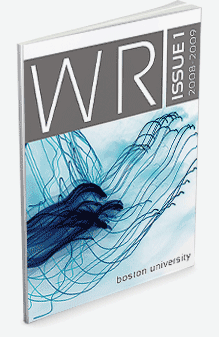
Related Links
arts&sciences | Spring 2010

Gaining Currency
By Jeremy Schwab
Fifteen freshmen sit in a semicircle, their laptops at the ready. Projected onto a 10-foot-square screen in front of them is an electronic portfolio of words and images created by a fellow student. The tapping of keystrokes fills the room. This is not your mother's or father's writing class.
The students, who are taking the second of two Arts & Sciences Writing Program seminars required of most Boston University undergraduates, are using a software program called Digication. It helps them create multimedia web pages that draw readers into their chosen research projects. But look past the new technology and you will see that traditional teaching methods still hold firm. Instructor Brad Queen (GRS'04) has students pair up to read and respond to drafts of one another's essays. He scooches his chair from one pair of students to the next, asking questions, challenging and encouraging them. Clearly, software designers have not yet invented a substitute for an instructor's individual attention.
The Writing Program offers almost 300 writing seminars a year, on topics that range from the poetry of war, to Bob Dylan's lyrics, to the promise and danger of crossing borders represented in American folklore. Queen's section focuses on First Amendment rights and explores issues such as freedom of speech during wartime and contemporary art and censorship. In the first seminar in the required two-semester sequence, typically taken in the fall semester of the first year, students focus on honing their skills as academic readers and writers. In the second seminar, typically taken the following spring, they develop their research skills. Additional courses are offered for nonnative speakers of English who require additional support. The Writing Program also maintains the Writing Center through which any of its students can receive one-on-one consultations.
All of the program's instructors teach students to think critically and to present their ideas clearly. The goal is to prepare students for the many writing assignments that they will face in their other academic courses.
"Writing is the intellectual currency of the university," explains Writing Program Director Joe Bizup. "In order to participate fully in the intellectual life of the school, students have to be writers."
Bizup, who directed the Undergraduate Writing Program at Columbia University before coming to BU in 2008, is currently working to expand the Writing Program so that it can support students throughout all four years of the undergraduate curriculum. "Since its inception in 2001," Bizup notes, "the Writing Program has grown into a robust first-year program. But the proposal that led to its creation also called for its eventual expansion into a four-year program. We're now working to build on the program's success and achieve that original vision." Bizup says it's important to ensure that students continue to grow as writers as they choose specialties and prepare to enter the workforce. Ultimately, good writing is essential to career success no matter what field students enter after college.
"Careers in the sciences, such as engineering, are not normally associated with writing, but in those fields writing is actually very important," says Bizup, noting that scientists who conduct research, for instance, must be strong writers. "Every profession is today a writing profession."
To read a selection of some of the most thought-provoking student essays, visit the new Writing Program journal WR.